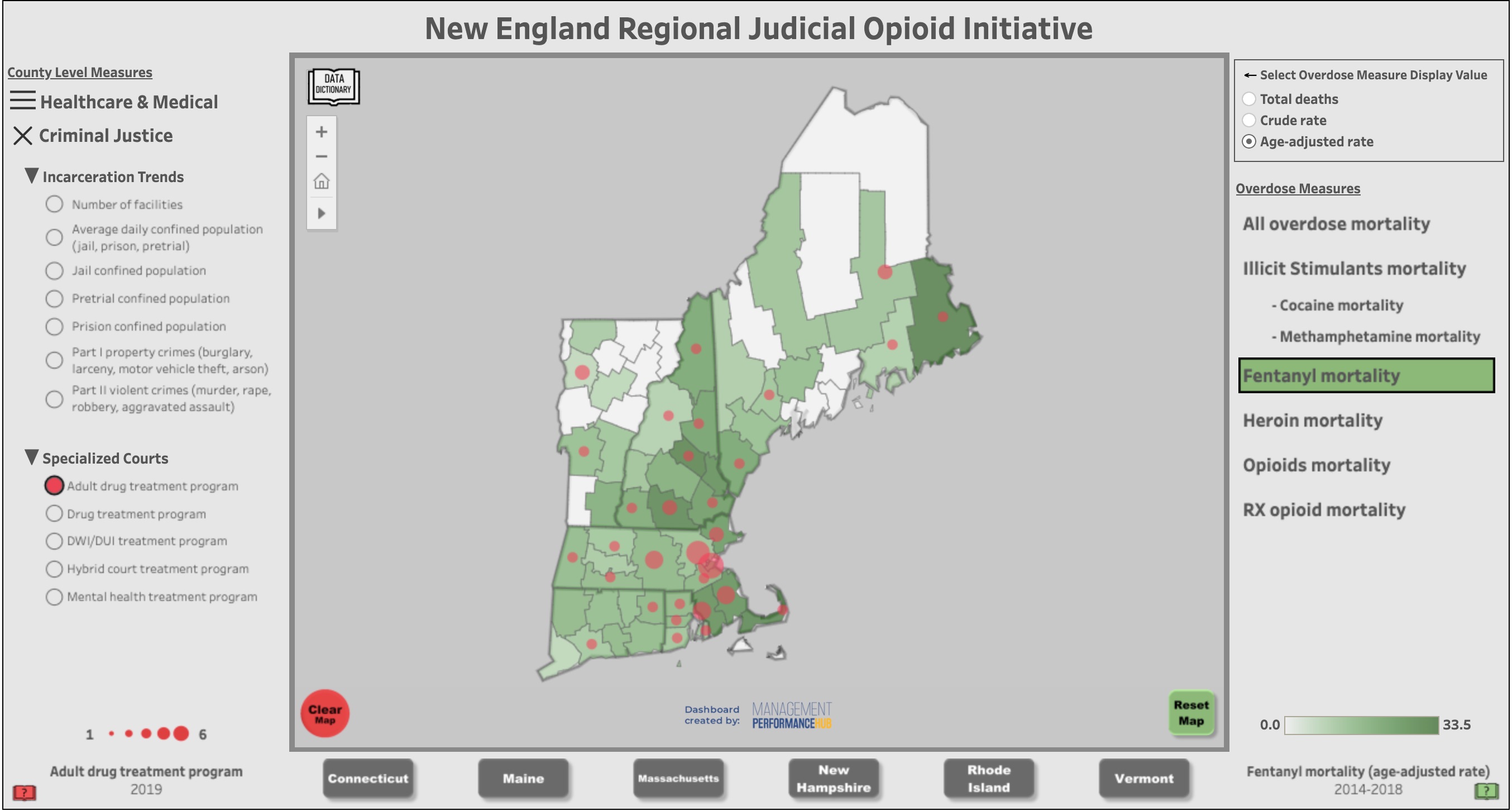| NE RJOI RESEARCH TEAM REPORTS |
|---|
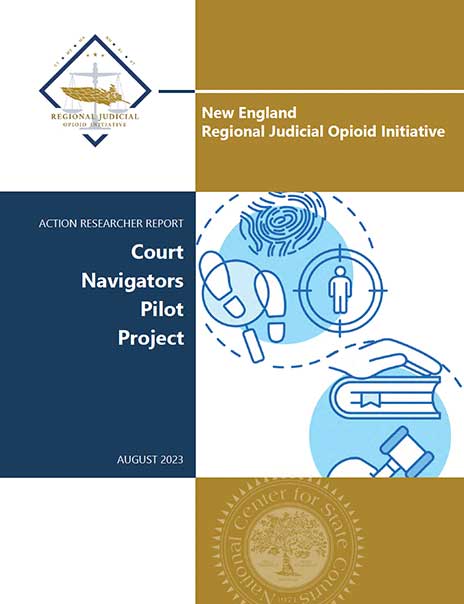
New England Regional Judicial Opioid Initiative Court Navigators Pilot Project, August 2023
This report provides results of a mixed-methods implementation analysis of court navigator programs as an intervention aimed at supporting substance use disorders in three courthouses in Connecticut, Maine, and Massachusetts. By using an implementation science framework to capture qualitative data on the court navigators’ intervention processes while examining administrative data collected by court navigators regarding their interactions, the research team focused on better understanding the intervention processes and possibilities for overdose prevention.
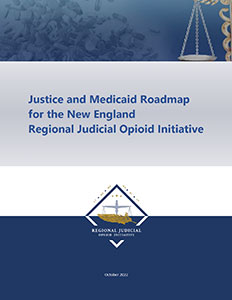
Justice and Medicaid Roadmap for the New England Regional Judicial Opioid Initiative, October 2022
To address data and research needs of the NE RJOI, an action research partner (Dr. Brad Ray with RTI International) was tasked with informing potential public health strategies. Given ongoing efforts to expand public healthcare to those involved with criminal-legal systems, the NE RJOI hosted a “Justice and Medicaid” workshop aimed at increasing knowledge of these systems among the stakeholders. This report, produced by the action research partners, presents justice and Medicaid approaches across the region by providing a state-by-state snapshot of current policies impacting incarcerated Medicaid beneficiaries and Medicaid-eligible individuals.
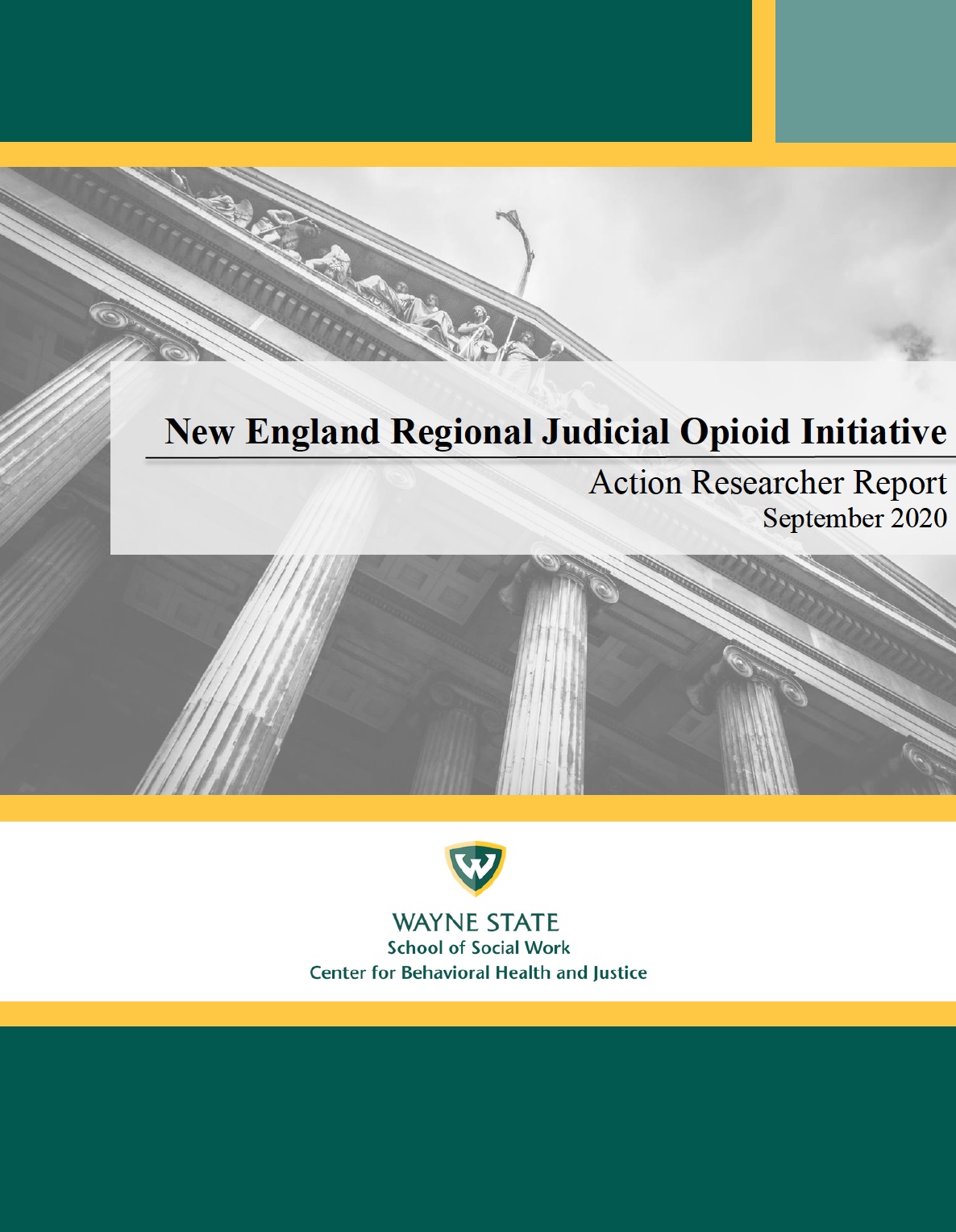
New England Regional Judicial Opioid Initiative: Action Researcher Report, September 2020
To aid in assessing and addressing the overdose crisis in the New England region, researchers from the Center for Behavioral Health and Justice at Wayne State University developed an interactive online data visualization tool at the county level of the New England RJOI states. The data visualization tool presents several measures relevant to the overdose crisis. This report discusses the method used to visualize substance-specific trends across the states at a county level, identifies 'hotspot' counties using age-adjusted overdose rates, shares mortality rates, healthcare and criminal justice indicators, and opioid fund allocation.
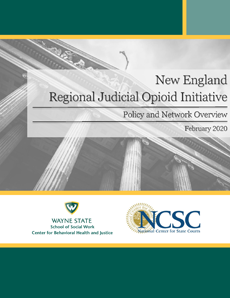
New England Regional Judicial Opioid Initiative: Policy and Network Overview, February 2020
In October of 2019, the Massachusetts Executive Office of the Trial Court was awarded a 3-year grant for 1.5 million on behalf of the six-state region (Connecticut, Maine, Massachusetts, New Hampshire, Rhode Island, and Vermont) from the U.S. Department of Justice, Bureau of Jumaristice Assistance and formed the New England Regional Judicial Opioid Initiative (NE RJOI). NE RJOI was formed based on a collaborative approach focused on the judicial and justice related responses to the opioid epidemic.
The grant allows NE RJOI to focus on leveraging data to create a regional view of the environment and developing data-driven interventions to reduce the impact of the opioid epidemic across the multi-state region. To accomplish the grant goals, NE RJOI is partnering with The Center for Behavioral Health and Justice (CBHJ) at Wayne State University.
| NE RJOI RESEARCH APPROACH |
|---|
Strategy #1: Assess the situation.
- Develop a snapshot picture of the opioid epidemic in the region.
- Utilize the Sequential Intercept Model as a framework to inventory evidence-based practices, resources, and needs at each stage of the justice system in each state, with a particular focus on the courts.
- Identify resources in the region that can be shared and taken to scale region-wide.
Strategy #2: Share aggregate data sets, including multiple systems within and across the multi-state region.
- Identify data sets to be aggregated and reported across the region.
- Create data maps to identify “hot spots.”
- Conduct data analysis of geo-coded information to identify high areas of abuse and sales and to ascertain how county level demographic, economic, health, and crime data are correlated with and help explain prescription drug abuse hot spots.
- Convene RJOI member officials, stakeholders, and data analysts to use the data to develop best practices in monitoring and intervention strategies.
- Identify and document best practices in data sharing and processes.
- Utilize an action research approach to analyze the data, develop strategies to address the problems, conduct assessments, and provide feedback to inform ongoing decision-making.
Strategy #3: Use data to inform appropriate evidence-based and best practice interventions and pilot appropriate interventions in targeted multi-state sites.
- Pilot evidence-based, best, and promising practice interventions in identified “hot spots” in multi-state sites.
- Deliver targeted and general education, training, and technical assistance by establishing a process to identify training and technical assistance needs and connect local sites with the experts within the region.
This project was supported in part by Grant No. 2018-AR-BX-K099 awarded by the Bureau of Justice Assistance (BJA). The BJA is component of the Department of Justice’s Office of Justice Programs, which also includes Bureau of Justice Statistics, the National institute of Justice, the Office of Justice and Delinquency Prevention, the Office for Victims of Crime, and the SMART Office. Points of view or opinions in this document are those of the author and do not necessarily represent the official position of policies of the U.S. Department of Justice. |
